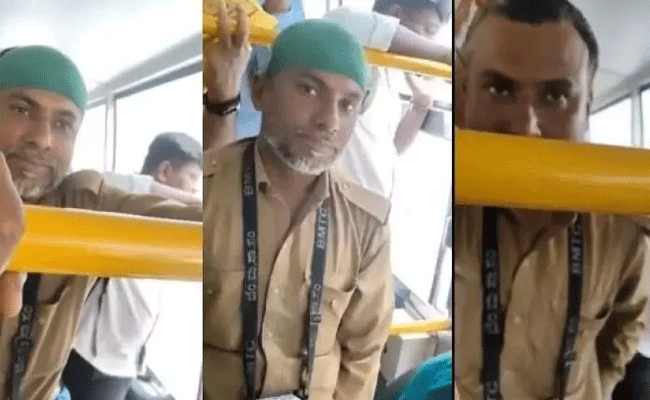Bengaluru: The Bengaluru Metropolitan Transport Corporation (BMTC), responding to a recent viral video of a lady passenger demanding the conductor of a city bus to remove his skull cap, said that the BMTC did not object to its staff members wearing their religious symbols to work.
A video clip of the incident that occurred in a BMTC bus a few days ago had gone viral on social media. A lady passenger, noticing the conductor wearing the skull cap, is seen severely objecting and arguing with him on the matter. The conductor, after great attempts to explain to her soberly that he had been wearing the cap to work for several years, is seen in the clip taking the cap off nonchalantly.
The clip, however, had drawn mixed response from viewers, with some supporting the passenger, saying she was merely getting the conductor to follow the law, while some users accused the woman of indulging in moral policing.
When contacted by the Vartha Bharati correspondent, BMTC PR officer Latha said, “We have not given an order for investigation into the incident, which occurred in a bus travelling from Shivajinagar to Uttarahalli, nor has a case been filed. We are also not looking for the lady.”
She further clarified, “The rules of the BMTC remain unchanged even after 40 years, in all matters of work, including uniform. The staff members are permitted by the BMTC to wear symbols of their respective religions, including the necklace of Shabarimala Ayyappa and skull cap.”
Let the Truth be known. If you read VB and like VB, please be a VB Supporter and Help us deliver the Truth to one and all.
Panaji (PTI): As part of a crackdown against tourist establishments violating laws and safety norms in the aftermath of the Arpora fire tragedy, Goa authorities on Saturday sealed a renowned club at Vagator and revoked the fire department NOC of another club.
Cafe CO2 Goa, located on a cliff overlooking the Arabian Sea at Vagator beach in North Goa, was sealed. The move came two days after Goya Club, also in Vagator, was shut down for alleged violations of rules.
Elsewhere, campaigning for local body polls, AAP leader Arvind Kejriwal said the fire incident at Birch by Romeo Lane nightclub at Arpora, which claimed 25 lives on December 6, happened because the BJP government in the state was corrupt.
An inspection of Cafe CO2 Goa by a state government-appointed team revealed that the establishment, with a seating capacity of 250, did not possess a no-objection certificate (NOC) of the Fire and Emergency Services Department. The club, which sits atop Ozrant Cliff, also did not have structural stability, the team found.
The Fire and Emergency Services on Saturday also revoked the NOC issued to Diaz Pool Club and Bar at Anjuna as the fire extinguishers installed in the establishment were found to be inadequate, said divisional fire officer Shripad Gawas.
A notice was issued to Nitin Wadhwa, the partner of the club, he said in the order.
Campaigning at Chimbel village near Panaji in support of his party's Zilla Panchayat election candidate, Aam Aadmi Party leader Kejriwal said the nightclub fire at Arpora happened because of the "corruption of the Pramod Sawant-led state government."
"Why this fire incident happened? I read in the newspapers that the nightclub had no occupancy certificate, no building licence, no excise licence, no construction licence or trade licence. The entire club was illegal but still it was going on," he said.
"How could it go on? Couldn't Pramod Sawant or anyone else see it? I was told that hafta (bribe) was being paid," the former Delhi chief minister said.
A person can not work without bribing officials in the coastal state, Kejriwal said, alleging that officers, MLAs and even ministers are accepting bribes.





